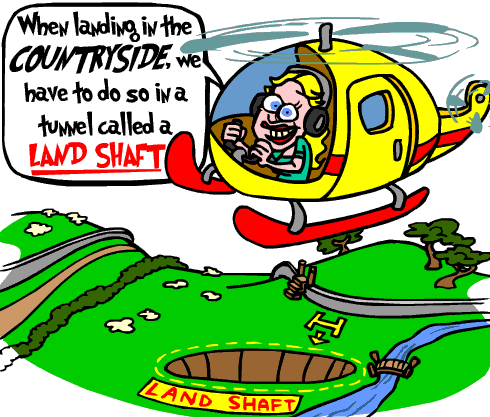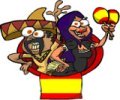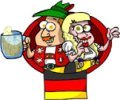German Feminine Gender of nouns

die Landschaft = countryside
... imagine in the countryside is a mining SHAFT where Cheryl Ladd (f) (formerly of Charlie’s Angels) is LANDing her helicopter - she calls it a LAND SHAFT!
The Definite Article (the) for German feminine nouns is die.
Die is also the plural form for all nouns with feminine, masculine or neuter genders.
How do you determine the gender of German nouns?
Below are some hints that will help you recognise the German nouns with feminine gender. The following are merely tips, and there are of, course, always exceptions to keep in mind.
- Cardinal Numbers (ie: die Eins, die Zwei)
- Professionals ending in “in”(ie: die Journalistin)
- Nationalities describing a person ending in “in”
(ie: die Amerikanerin)
- Nouns that end in “ik” (ie: die Mathematik)
- Names of planes (ie: die Boeing)
- Nouns ending in “e” (ie: die Pistole)
- Kinds of flowers and trees (ie: die Rose)
- Foreign nouns (ie: die Initiative)
- Nouns ending in “ie” (ie: die Komödie)
- Nouns ending in “keit” (ie: die Möglichkeit)
- Nouns ending in “schaft” (ie: die Landschaft)
Forming German feminine words from the masculine is quite straightforward, e.g. for occupations. Many words that refer to a man or masculine object can be changed to become feminine.
Below is the basic formula for constructing a feminine word.
- Start with a masculine word.
- der Arzt (the male doctor)
- Add “in” as the feminine ending. - "der Arztin"
- Change the definite article to “die” (the feminine article)
die Artzin (the female doctor)
You can do this with most nouns that describe a profession or nationality.
Other examples:
der Student (the male student)
die Studentin
(the female student)
die Studentinnen (the female students)
der Amerikaner (the male American)
die Amerikanerin (the female American)
die Amerikanerinnen (the female Americans)
Note: German feminine nouns ending in -in add -nen in the plural.
Learn the feminine gender of German nouns at the same time as learning the word
When learning German vocab, the best thing is to learn the genders of nouns at the same time.
200 Words a Day! unique Gender Triggers will help you learn and recall German words and their genders, quickly, easily and effectively.
Learn more than 1000 German words including nouns of German feminine, masculine and neuter gender.
Try it and see for yourself. Boost your vocab and your German learning with 200 Words a Day!
200 Words a Day! Learn German
*Cartoon by Nigel Ward
200 Words a Day! and Exceltra
©Copyright
2004-2023 All Rights Reserved
IMAGINE how you'd
FEEL
seeing yourself learning at a rate of 200 words a day ... the ideal companion course that complements any language course.
|










New! Comments
Have your say about what you just read! Leave us a comment in the box below.